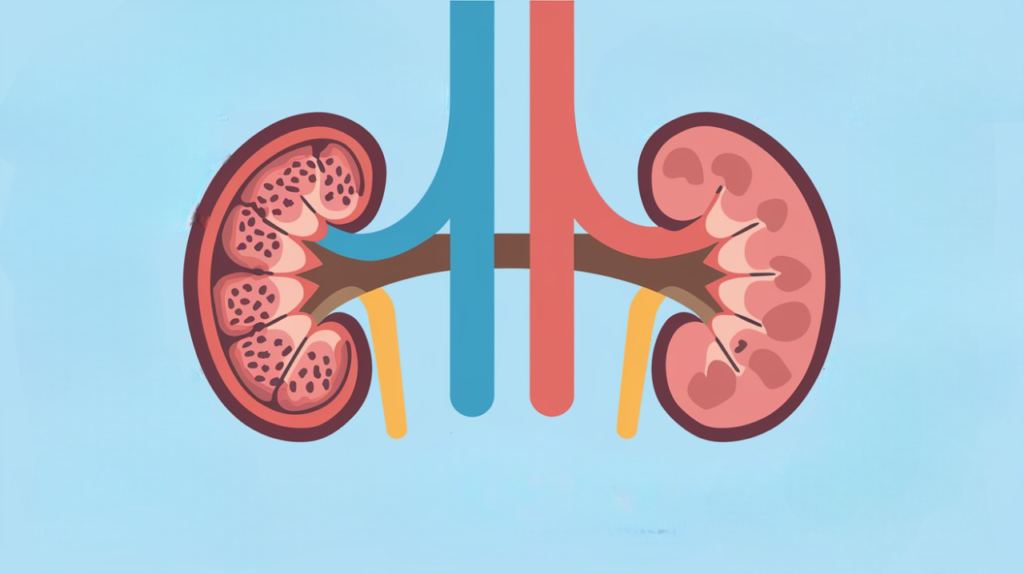
Kidney stones are hard deposits made of minerals and salts that form inside your kidneys. These painful formations affect millions of people worldwide and are becoming increasingly common due to modern lifestyle and dietary habits.
Formation and Types: Kidney stones develop when certain minerals and salts in your urine become highly concentrated and crystallize. The most common types include:
- Calcium oxalate stones: Most frequent type, linked to high-oxalate diets
- Uric acid stones: Associated with high-protein diets
- Struvite stones: Often caused by urinary tract infections
- Cystine stones: Result from a genetic disorder affecting amino acid processing
Main Causes:
- Dehydration is a leading cause, as it reduces urine volume and increases mineral concentration
- Poor dietary choices, especially high intake of oxalate-rich foods, salt, or protein
- Genetic predisposition
- Medical conditions like hyperparathyroidism, gout, and UTIs
- Certain medications and excessive supplement intake
Key Symptoms: When kidney stones become problematic, they typically cause:
- Severe, sharp pain in the lower back or side that may radiate to the abdomen or groin
- Burning sensation during urination
- Blood in urine (appearing pink, red, or brown)
- Frequent urge to urinate
- Nausea and vomiting due to pain intensity
- Cloudy or foul-smelling urine, which may indicate infection
Diagnosis Methods: Healthcare providers typically use:
- Imaging tests (CT scans, ultrasounds, or X-rays) to locate stones and determine their size
- Urine tests to identify stone-forming substances
- Blood tests to check for elevated levels of minerals
- Stone analysis if one is passed, to determine its composition
Treatment Approaches: Treatment varies based on stone size, location, and symptom severity:
- Small Stones (usually under 4mm):
- Increased water intake to help pass the stone naturally
- Pain management with over-the-counter or prescription medications
- Waiting for natural passage while monitoring symptoms
- Larger Stones or Severe Cases:
- Extracorporeal Shock Wave Lithotripsy (ESWL): Using sound waves to break stones into smaller, passable pieces
- Ureteroscopy: Inserting a scope through the urethra to remove or break down stones
- Percutaneous Nephrolithotomy: Surgical removal for very large stones
- Medications like alpha-blockers to help stones pass more easily
Prevention Strategies: Several lifestyle modifications can help prevent kidney stones:
- Hydration:
- Drink 8-10 glasses of water daily
- Maintain clear or light yellow urine color
- Increase fluid intake during hot weather or exercise
- Dietary Adjustments:
- Limit oxalate-rich foods (spinach, nuts, chocolate)
- Reduce salt and animal protein intake
- Maintain balanced calcium intake through diet rather than supplements
- Avoid excessive vitamin C supplementation
- Lifestyle Changes:
- Maintain a healthy weight
- Exercise regularly
- Manage underlying medical conditions
- Monitor medication and supplement use
Long-term Management: For those who have experienced kidney stones, ongoing management is crucial:
- Regular medical check-ups
- Periodic imaging to monitor for new stone formation
- Continued adherence to prevention strategies
- Possible dietary modifications based on stone type
- Regular testing of urine and blood when recommended
When to Seek Medical Help: Immediate medical attention is necessary if you experience:
- Severe pain that doesn’t improve with over-the-counter medication
- Pain accompanied by fever and chills
- Difficulty urinating
- Blood in urine
- Persistent nausea and vomiting
Living with or preventing kidney stones requires awareness and proactive health management. While they can be extremely painful, most kidney stones can be managed effectively with proper medical care and lifestyle modifications. The key is staying hydrated, maintaining a balanced diet, and seeking prompt medical attention when symptoms arise. For those with recurring stones, working closely with healthcare providers to develop a personalized prevention plan is essential for long-term health management.
